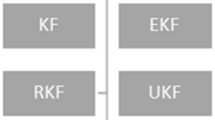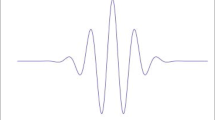Abstract
How to compute the sparse fast Fourier transform (sFFT) has been a critical topic for a long period of time. sFFT algorithms have faster runtimes and reduced sampling complexities by taking advantage of a signal’s inherent characteristics, namely, that a large number of signals are sparse in the frequency domain (e.g., sensors, video data, audio, medical images.). The first step of sFFT is frequency bucketization through window filters. sFFT algorithms using a flat filter are more convenient and efficient than other algorithms because the filtered signal is concentrated both in the time domain and frequency domain. To date, three sFFT algorithms using the flat filter (the sFFT1.0, sFFT2.0, and sFFT3.0 algorithms) have been proposed by the Massachusetts Institute of Technology (MIT) beginning in 2013. Since then, the sFFT4.0 algorithm using a multiscale approach method has not yet been implemented. This paper will discuss this algorithm comprehensively in theory and implement it in practice. It is proven that the performance of the sFFT4.0 algorithm depends on two parameters. The runtime and sampling complexity are directly correlated to the multiscale parameter and inversely correlated to the extension parameter. The robustness is in directly correlated to the extension parameter and in inverse ratio to the multiscale parameter. Compared with three similar algorithms and four different types of algorithms, the sFFT4.0 algorithm displays an improved runtime and sampling complexity that is ten to one hundred times better than the FFTW algorithm, although the robustness of the algorithm is moderate.













Similar content being viewed by others
Data Availability
The supporting data of this study are available from the corresponding author on request.
Notes
The code is available at http://groups.csail.mit.edu/netmit/sFFT/.
The code is available at https://github.com/urrfinjuss/mpfft.
The code is available at https://www.iis.sinica.edu.tw/pages/lcs.
The code is available at https://github.com/UCBASiCS/FFAST.
The code is available at https://sourceforge.net/projects/aafftannarborfa/.
The code is available at http://www.fftw.org/.
References
O. Abari, E. Hamed, H. Hassanieh, A. Agarwal, D. Katabi, A.P. Chandrakasan, V. Stojanovic, A 0.75-million-point fourier-transform chip for frequency-sparse signals, in Digest of Technical Papers—IEEE International Solid-State Circuits Conference (2014). https://doi.org/10.1109/ISSCC.2014.6757512
V.S. Amin, Y.D. Zhang, B. Himed, Sequential time-frequency signature estimation of multi-component FM signals, in 2019 53rd Asilomar Conference on Signals, Systems, and Computers (IEEE, 2019), p. 1901–1905
V.S. Amin, Y.D. Zhang, B. Himed, Sparsity-based time-frequency representation of FM signals with burst missing samples. Signal Process. 155, 25–43 (2019)
R.G. Baraniuk, Compressive sensing [lecture notes]. IEEE Signal Process. Mag. 24(4), 118–121 (2007)
G.L. Chen, S.H. Tsai, K.J. Yang, On performance of sparse fast Fourier transform and enhancement algorithm. IEEE Trans. Signal Process. 65(21), 5716–5729 (2017). https://doi.org/10.1109/TSP.2017.2740198
J. Chiu, Matrix probing, skeleton decompositions, and sparse Fourier transform. Thesis (Ph.D.). Massachusetts Institute of Technology, Department of Mathematics (2013). https://doi.org/10.1007/978-94-007-2739-7_22
A. Christlieb, D. Lawlor, Y. Wang, A multiscale sub-linear time Fourier algorithm for noisy data. Appl. Comput. Harmon. Anal. 40(3), 553–574 (2016)
A.G. Farashahi, Wave packet transform over finite fields. Electron. J. Linear Algebra 30(1), 507–529 (2015)
A.G. Farashahi, Wave packet transforms over finite cyclic groups. Linear Algebra Appl. 489, 75–92 (2016)
A. Ghaani Farashahi, Cyclic wave packet transform on finite abelian groups of prime order. Int. J. Wavelets Multiresolut. Inf. Process. 12(06), 1450,041 (2014)
A.C. Gilbert, S. Guha, P. Indyk, S. Muthukrishnan, M. Strauss, Near-optimal sparse Fourier representations via sampling, in Conference Proceedings of the Annual ACM Symposium on Theory of Computing, vol. 2 (2002), p. 152–161. https://doi.org/10.1145/509931.509933
A.C. Gilbert, M.J. Strauss, J.A. Tropp, A tutorial on fast Fourier sampling: how to apply it to problems 25(2), 57–66 (2008). https://doi.org/10.1109/MSP.2007.915000
A.C. Gilbert, P. Indyk, M. Iwen, L. Schmidt, Recent developments in the sparse Fourier transform. IEEE Signal Process. Mag. 31, 1–21 (2014). https://doi.org/10.1109/MSP.2014.2329131
H. Hassanieh, P. Indyk, D. Katabi, E. Price, Nearly optimal sparse Fourier transform, in Proceedings of the Annual ACM Symposium on Theory of Computing (2012), p. 563–577. https://doi.org/10.1145/2213977.2214029. arXiv:1201.2501
H. Hassanieh, P. Indyk, D. Katabi, E. Price, Simple and practical algorithm for sparse Fourier transform. in Proceedings of the Annual ACM-SIAM Symposium on Discrete Algorithms (2012), p. 1183–1194. https://doi.org/10.1137/1.9781611973099.93
S.H. Hsieh, C.S. Lu, S.C. Pei, Sparse fast Fourier transform by downsampling, in ICASSP, IEEE International Conference on Acoustics, Speech and Signal Processing-Proceedings (2013), p. 5637–5641. https://doi.org/10.1109/ICASSP.2013.6638743
S.H. Hsieh, C.S. Lu, S.C. Pei, Sparse fast Fourier transform for exactly and generally k-sparse signals by downsampling and sparse recovery. Eprint Arxiv (2014)
P. Indyk, M. Kapralov, E. Price, (Nearly) sample-optimal sparse Fourier transform, in Proceedings of the Annual ACM-SIAM Symposium on Discrete Algorithms (2014), p. 480–499. https://doi.org/10.1137/1.9781611973402.36
M.A. Iwen, Combinatorial sublinear-time Fourier algorithms. Found. Comput. Math. 10(3), 303–338 (2010). https://doi.org/10.1007/s10208-009-9057-1
M.A. Iwen, Improved approximation guarantees for sublinear-time Fourier algorithms. Appl. Comput. Harmon. Anal. 34(1), 57–82 (2013). https://doi.org/10.1016/j.acha.2012.03.007
M.A. Iwen, A. Gilbert, M. Strauss, Empirical evaluation of a sub-linear time sparse DFT algorithm. Commun. Math. Sci. 5(4), 981–998 (2007). https://doi.org/10.4310/cms.2007.v5.n4.a13
Z. Jiang, J. Chen, B. Li, Empirical evaluation of typical sparse fast Fourier transform algorithms. IEEE Access 9, 97100–97119 (2021)
M. Kapralov, Sample efficient estimation and recovery in sparse FFT via isolation on average, in Annual Symposium on Foundations of Computer Science—Proceedings, vol. 2017(1) (2017), p. 651–662. https://doi.org/10.1109/FOCS.2017.66
M. Kapralov, A. Velingker, A. Zandieh, Dimension-independent sparse Fourier transform, in Proceedings of the Annual ACM-SIAM Symposium on Discrete Algorithms (2019). https://doi.org/10.1137/1.9781611975482.168
G.G. Kumar, S.K. Sahoo, P.K. Meher, 50 Years of FFT algorithms and applications. Circuits Syst. Signal Process. 38(12), 5665–5698 (2019). https://doi.org/10.1007/s00034-019-01136-8
B. Li, Z. Jiang, J. Chen, On performance of sparse fast Fourier transform algorithms using the flat window filter. IEEE Access 8, 79134–79146 (2020)
B. Li, Z. Jiang, J. Chen, On performance of sparse fast Fourier transform algorithms using the aliasing filter. Electronics (2021). https://doi.org/10.3390/electronics10091117
A. López-Parrado, J. Velasco Medina, Efficient software implementation of the nearly optimal sparse fast Fourier transform for the noisy case. Ingeniería y Ciencia 11(22), 73–94 (2015). https://doi.org/10.17230/ingciencia.11.22.4
S. Merhi, R. Zhang, M.A. Iwen, A. Christlieb, A new class of fully discrete sparse Fourier transforms: faster stable implementations with guarantees. J. Fourier Anal. Appl. 25(3), 751–784 (2019). https://doi.org/10.1007/s00041-018-9616-4arXiv:1706.02740
F. Ong, R. Heckel, K. Ramchandran, A fast and robust paradigm for fourier compressed sensing based on coded sampling. ICASSP, in IEEE International Conference on Acoustics, Speech and Signal Processing—Proceedings, vol. 2019 (2019), p. 5117–5121. https://doi.org/10.1109/ICASSP.2019.8682063
C. Pang, S. Liu, Y. Han, High-speed target detection algorithm based on sparse Fourier transform. IEEE Access 6, 37828–37836 (2018)
S. Pawar, K. Ramchandran, Computing a k-sparse n-length discrete Fourier transform using at most 4k samples and O(k log k) complexity, in IEEE International Symposium on Information Theory—Proceedings (2013), p. 464–468. https://doi.org/10.1109/ISIT.2013.6620269. arXiv:1305.0870
S. Pawar, K. Ramchandran, A robust sub-linear time R-FFAST algorithm for computing a sparse DFT (2015), p. 1–35. arXiv:1501.00320
S. Pawar, K. Ramchandran, FFAST: an algorithm for computing an exactly k-sparse DFT in O(k log k) time. IEEE Trans. Inform Theory 64(1), 429–450 (2018). https://doi.org/10.1109/TIT.2017.2746568
G. Plonka, K. Wannenwetsch, A deterministic sparse FFT algorithm for vectors with small support. Numeri. Algorithms 71(4), 889–905 (2016). https://doi.org/10.1007/s11075-015-0028-0arXiv:1504.02214
G. Plonka, K. Wannenwetsch, A sparse fast Fourier algorithm for real non-negative vectors. J. Comput. Appl. Math. 321, 532–539 (2017). https://doi.org/10.1016/j.cam.2017.03.019
G. Plonka, K. Wannenwetsch, A. Cuyt, W.S. Lee, Deterministic sparse FFT for M-sparse vectors. Numer. Algorithms 8, 9 (2018). https://doi.org/10.1007/s11075-017-0370-5
R. Roy, T. Kailath, Esprit-estimation of signal parameters via rotational invariance techniques. IEEE Trans. Acoust. Speech Signal Process. 37(7), 984–995 (1989)
R. Schmidt, Multiple emitter location and signal parameter estimation. IEEE Trans. Antennas Propag. 34(3), 276–280 (1986)
J. Schumacher, M. Püschel, High-performance sparse fast Fourier transforms. IEEE Workshop on Signal Processing Systems, SiPS: Design and Implementation (2014). https://doi.org/10.1109/SiPS.2014.6986055
P. Stoica, R. Moses, Spectral Analysis of Signals (Prentice Hall Inc, Upper Saddle River, 2005)
C. Wang, CusFFT: a high-performance sparse fast fourier transform algorithm on GPUs. in Proceedings—2016 IEEE 30th International Parallel and Distributed Processing Symposium, IPDPS (2016), p. 963–972. https://doi.org/10.1109/IPDPS.2016.95
S. Wang, V.M. Patel, A. Petropulu, Multidimensional sparse Fourier transform based on the Fourier projection-slice theorem. IEEE Trans. Signal Process. 67(1), 54–69 (2019). https://doi.org/10.1109/TSP.2018.2878546
Acknowledgements
This work was supported by the Youth Program of National Natural Science Foundation of China under Grant 61703263.
Author information
Authors and Affiliations
Corresponding author
Additional information
Publisher's Note
Springer Nature remains neutral with regard to jurisdictional claims in published maps and institutional affiliations.
Rights and permissions
About this article
Cite this article
Li, B., Jiang, Z. & Chen, J. Performance of the Multiscale Sparse Fast Fourier Transform Algorithm. Circuits Syst Signal Process 41, 4547–4569 (2022). https://doi.org/10.1007/s00034-022-01989-6
Received:
Revised:
Accepted:
Published:
Issue Date:
DOI: https://doi.org/10.1007/s00034-022-01989-6




